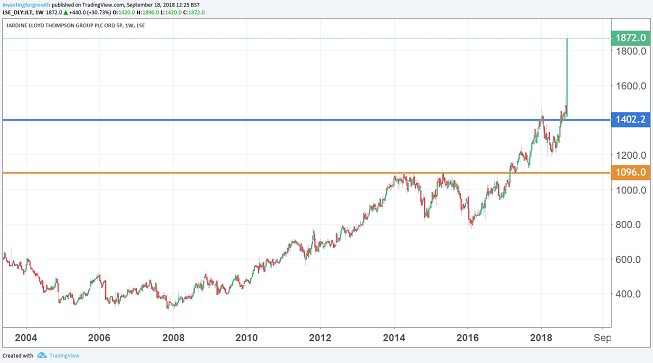M&A speculation hots up after insurance mega bid
18th September 2018 12:48
by Graeme Evans from interactive investor
Already subject of recent consolidation, the insurance sector is back in play, writes Graeme Evans who also names another target in the heart of the City.

Any investors fearful that Brexit uncertainty has put off deal-makers will be reassured by today's proposed blockbuster buy-out of Jardine Lloyd Thompson Group, and speculation of a Santander bid for City broker Peel Hunt.
The 1,915p a share move for JLT is particularly impressive, given that the insurance, reinsurance and employee benefits specialist was setting record highs at £10 just two years ago. The £4.3 billion proposal from US-based Marsh & McLennan is also a 37% premium to the three-month trading average.
The move will fuel speculation about a fresh round of M&A activity in the insurance and wider financial services sector, driven as ever by the need for scale and a global presence in the face of emerging tech threats and pressure on pricing. Continued cheap financing may spur on further deals.
The new regulatory landscape since MiFID II has also changed life for banks and brokers, and is expected to be the trigger for further consolidation.
According to Sky News, the Spanish lender Santander is in the early stage of talks to buy City stockbroker Peel Hunt for a price of no more than tens of millions of pounds. The firm last changed hands in 2010 when its staff took majority ownership from Belgian bank KBC in a deal worth £74 million.
Finncap analyst Jeremy Grime noted the sale price to KBC in 2000 had been £265 million. He said:
"I'm not aware of anything so statistically correlated with the stockmarket cycle than the sale of Peel Hunt."
Peel Hunt has not confirmed the talks but has insisted that it is not up for sale.
Having been approached by the boss of Marsh & McLennan with a "compelling proposal" only a few days ago, the decision by the JLT board to back a sale reflects an opportunity to secure "attractive value for all shareholders".

Source: TradingView (*) Past performance is not a guide to future performance
This comes despite strategic and financial progress in recent months. It has turned around the UK and Ireland employment benefits business and is continuing to make inroads in the US, where Marsh & McLennan is based.
Under the current management team, JLT has delivered an annualised total shareholder return of 13% over the past 13 years.
But just over a year ago, words such as "unexciting", "up to speed", and "not without challenges" were being used in our coverage to describe JLT's performance at a time when shares were about 1,167p.
Then it was trading with a forecast 2018 price earnings multiple of 17, compared with roughly 30 under the proposed deal with Marsh & McLennan.
Supporters of today's acquisition include Jardine Matheson, which owns 40% of JLT, having increased this stake in 2011. However, it is now increasingly looking to focus on its Asia operations.
JMH's involvement as a major shareholder dates back to the formation of Jardine Insurance Brokers by JMH in 1972, which subsequently merged with the Lloyd Thompson Group in 1997 to form JLT.
JLT is now one of the world's leading providers of insurance, reinsurance and employee benefits related advice, with more than 10,000 employees.
*The horizontal lines on the chart represent previous technical support and resistance levels.
These articles are provided for information purposes only. Occasionally, an opinion about whether to buy or sell a specific investment may be provided by third parties. The content is not intended to be a personal recommendation to buy or sell any financial instrument or product, or to adopt any investment strategy as it is not provided based on an assessment of your investing knowledge and experience, your financial situation or your investment objectives. The value of your investments, and the income derived from them, may go down as well as up. You may not get back all the money that you invest. The investments referred to in this article may not be suitable for all investors, and if in doubt, an investor should seek advice from a qualified investment adviser.
Full performance can be found on the company or index summary page on the interactive investor website. Simply click on the company's or index name highlighted in the article.